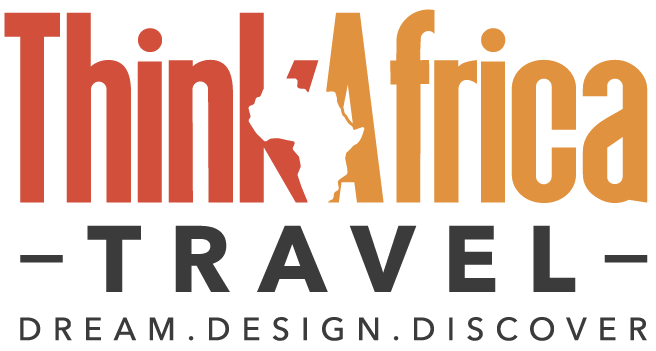- Home
- Botswana
-
-
- Okavango Delta
- Abu Camp
- Baines’ Camp
- Camp Okavango
- Chitabe Camp
- Chitabe Lediba Camp
- Daunara Safari Camp
- Duba Plains Camp
- Eagle Island Lodge
- Jacana Camp
- Jao Camp
- Kanana Camp
- Kwara
- Kwetsani Camp
- Little Vumbura Camp
- Maxa
- Nxabega Okavango Tented Camp
- Sandibe Okavango Safari Lodge
- Seba Camp
- Shinde Camp
- Shinde Footsteps
- Sitatunga Private Island
- Stanleys Camp
- Tubu Tree Camp
- Vumbura Plains Camp
- Xugana Island Lodge
- Okavango Delta
-
- Chobe and Linyanti
- Chobe Bakwena
- Chobe Game Lodge
- Chobe Chilwero
- Chobe River Lodge
- Chobe Savanna Lodge
- Chobe Under Canvas
- Duma Tau Camp
- King’s Pool Camp
- Kwando Lagoon
- Kwando Lebala
- Linyanti Bush Camp
- Mowana Safari Lodge
- Muchenje Safari Lodge
- Savute Elephant Camp
- Savute Safari Lodge
- Savute Under Canvas
- Savuti Camp
- Selinda Camp
- Zarafa Camp
- Chobe and Linyanti
-
-
- Other Destinations
-
- Inspiration
-
-
- Fly in Safaris
- Best of Botswana Safari
- Botswana Migrations and Predators Safari
- Combination of Hwange and Matobo
- Discover Botswana Fly-in Safari
- 9 Nights Kiri Camp, Ngoma Safari Lodge, & Verney’s Camp
- Explore Duba and Selinda Reserves
- Explore Kafuwe National Park in Zambia
- Fly me across Botswana Safari
- Nehimba Lodge and Bomani Tented Lodge
- Fly in Safaris
-
- Planning a Safari
- Contact Us
PLANNING
a Safari
Planning a safari in Botswana is an exhilarating prospect, but the sheer range of options—diverse ecosystems, seasonal wildlife movements, differing camp styles, and complex flight logistics—can feel overwhelming. Before you reserve anything, think about the time of year and how the Okavango Delta’s annual flood or the Kalahari’s summer rains will shape game-viewing conditions; decide which regions best match your interests, whether predator-rich Savute, the elephant corridors of Chobe, or the stark beauty of the Makgadikgadi Pans; and clarify your preferred level of comfort and budget, from mobile expeditions to luxury lodges accessed by light aircraft. Factor in visa and health requirements, baggage limits for bush flights, and the need for comprehensive travel insurance, then consider whether you want to extend your journey to nearby highlights such as Victoria Falls or Namibia’s desert dunes. Careful attention to these details will transform initial excitement into a seamless, deeply rewarding holiday.
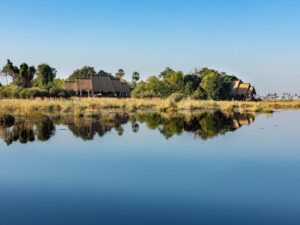
About Botswana
Botswana is one of Africa’s top safari destinations, renowned for its pristine wilderness, political stability, and low-impact tourism. Home to the Okavango Delta, Chobe National Park, the Kalahari, and Moremi Game Reserve, it offers diverse landscapes and abundant wildlife. Exclusive lodges, exceptional guiding, and vast protected areas make Botswana ideal for an authentic safari experience.

Arts and Crafts
Botswana’s arts and crafts reflect its cultural richness and creativity. From world-renowned basketry and pottery to woodcarving, bone jewellery, Bushman beadwork, and mokoros of the Okavango Delta, each piece tells a story. Visitors can explore and purchase these handcrafted items in curio shops, markets, and safari lodges, supporting rural artisans and traditional skills.
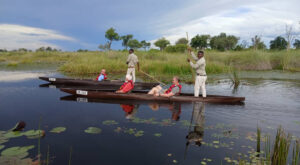
Botswana Entry Requirements
Visitors to Botswana need a passport valid for at least six months with two or more blank pages. Many travelers, including those from the U.S., Europe, and Commonwealth countries, can enter visa-free for up to 90 days; others must apply in advance or via e‑Visa. Yellow fever vaccination is required only if arriving from a high-risk country; minors need certified birth and consent documentation

Health and Safety
ravelers to Botswana should get travel health insurance and plan for possible evacuation, as rural medical facilities are limited. Vaccinations (e.g., yellow fever if arriving from endemic countries) and malaria prophylaxis—especially in the north—are essential. Protect yourself from insect and tick bites. Drink bottled or boiled water only, and be cautious with food and wildlife.

Responsible Travel
We encourage all guests to travel responsibly in Botswana—respecting wildlife, conserving nature, and embracing local culture. Observe animals quietly, minimize waste, stay on trails, and conserve water. Use eco-friendly products and engage with communities respectfully. Even simple Setswana greetings like “Dumela” (hello) and “Ke a leboga” (thank you) help build genuine connections.
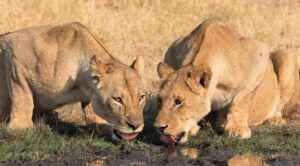
Travel Insurance
Comprehensive travel and medical insurance is essential for Botswana. Ensure your policy covers medical emergencies, cancellations, lost luggage, delays, and high-risk activities. Buy it when you book, and check for exclusions. Airlines offer limited compensation for lost bags, so reliable cover protects your health, belongings, and investment from the unexpected before and during travel.
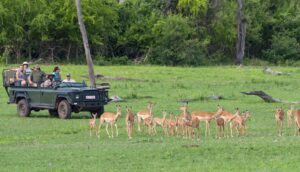
What to bring
Pack lightweight, neutral-colored clothing, a wide-brimmed hat, sunglasses, sunscreen, and comfortable walking shoes. Include warm layers for early mornings, a good pair of binoculars, insect repellent, and a camera with spare batteries. Soft bags are preferred for light aircraft. Don’t forget travel insurance, medications, and a refillable water bottle for eco-conscious travel.

Wildlife Photography
Botswana is a dream for wildlife photography—bring a quality camera, telephoto lens (200mm+), plenty of memory cards, spare batteries, and binoculars. Private vehicles, off-road concessions, and night drives offer great photo opportunities. Always ask locals before photographing people. Research the culture and wildlife in advance to better capture the magic of your safari.
DREAM
DESIGN
DISCOVER
Plan your bespoke safari with Think Africa Travel and experience Chobe the way it was meant to be intimate, immersive, and unforgettable.
CONTACT US ON +267 686 1797 OR ENQUIRE BELOW
